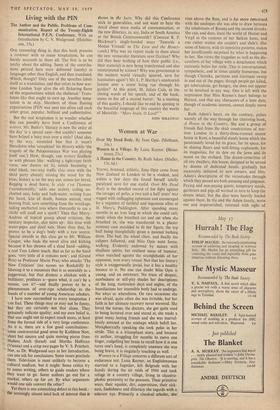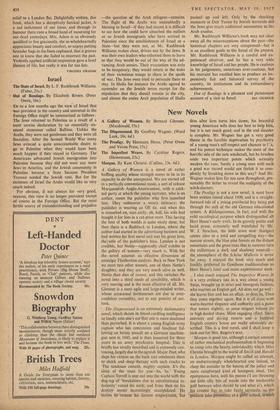Women at War
YOUNG, bronzed, athletic, June Opie came from New Zealand to London to be a student, and within a few days she found herself totally paralysed save for one eyelid. Over My Dead Body is the detailed record of her fight against the ravages of polio, a two and a half years' war waged with unflagging optimism and encouraged by a regim6nt of faithful and ingenious allies at St. Mary's, Paddington. After spending many months in an iron lung in which she could only speak when she breathed out and eat when she breathed in, she was transferred to a plaster mummy case moulded to fit her figure, the top half being thoughtfully given a painted bathing dress. The bed, the wheel chair, and finally the calipers followed, and Miss Opie went home, walking. Evidently endowed by nature with ebullient spirits, her resilient sense of humour, when matched against the strangleholds of her opponent, won every round. Not that her literary style is exaggeratedly jovial, but it has a healthy bounce to it. No one can doubt Miss Opie is young, and an extrovert. No trace of despair, morbidness or self-pity shades her descriptions of the long, motionless days and nights, of the humiliations her insensible body had to undergo. No whys or wherefores. On rare occasions she was afraid, quite often she was irritable, but her faith in her ultimate recovery never wavered. She loved the nurses, the doctors, she got quite used to being lectured over and stared at, she made a great many lasting friends and she was marvel- lously amused at the mishaps which befell her. Metaphorically speaking she took polio in her stride. This is a triumphant story, and because its author, struggling for months to move one finger, cudgelling her brain to recall how it is one turns one's head, is completely unaware she was being brave, it is singularly touching as well.
Women in a Village concerns a different sort of endurance test. Luisa Rayner, an Englishwoman married to a Jugoslav, left Belgrade with her family during the air raids of 1944 and took refuge in a country village, living in claustro- phobic proximity to the peasants. Their primitive ways, their squalor, dirt, superstition, their sick- ness, foolishness and illiteracy she regards with a tolerant eye. Primarily a classical scholar, she
rises above the fleas, and is far more concerned with the analogies she was able to draw between the inhabitants of Rusanj and the ancient Greeks. She can, and does, trace the world of Homer and Virgil in the customs of her Balkan hosts, and one rather wishes she couldn't and didn't. Her sense of history, with its repetitive patterns, makes her insufficiently surprised by what is happening to her. She views the tragedies as well as the dis- comforts of her village with a detachment which curiously belies her style. This is conversational, sympathetic, and at times quietly humorous, but though Chetniks, partisans and Germans sweep in and out of the pages; though people get killed, get tuberculosis, get hungry, she does not appear to be involved in any way. One is left with the impression that Miss Rayner's heart belongs to Horace, and that any characters of a later date, though of academic interest, cannot deeply move her.
Ruth Adam's heart, on the contrary, pulses warmly all the way through her charming book, A House in the Country. She and a group of friends fled from the drab constrictions of war- time London to a thirty-three-roomed manor house in Kent, a beautiful stately home which she passionately loved for its grace, for its space, for its shining floors and well-fitting cupboards, for its magnolias, for its dew on the lawn and its moon on the orchard. The dream-come-true of all city dwellers, this house, designed to be served by dozens of dedicated hands, gradually but inexorably defeated its new owners, and Mrs. Adam's descriptions of the vicissitudes through which they passed are both amusing and poignant. Paying and non-paying guests, temporary maids, gardeners and pigs all worked in turn to keep the dream intact, but the dice 'were heavily loaded against them. In the end the Adam family, worn out and impoverished, returned with sighs of relief to a London flat. Delightfully written, this book, which has a deceptively farcical jacket, is a sad indictment of our times, and through its humour there runs a broad band• of mourning for our dead yesterdays. Mrs. Adam is so obviously qualified to live graciously, she so +wholeheartedly appreciates beauty and comfort, so enjoys putting lavender bags in the linen cupboard, that it grieves one to know that she failed to resurrect the past. Violently applied artificial respiration gave a brief illusion of life, but really it was far too late.
VIRGINIA GRAHAM



































 Previous page
Previous page